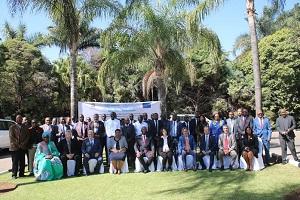
Almost all of Zambia’s territory sits within transboundary rivers basins, the Zambezi and Congo River Basins each covering approximately 75% and 25%, respectively, of Zambia’s territorial area.
In this context, Zambia has confirmed its intention to accelerate the accession process to the Convention on the Protection and Use of Transboundary Watercourses and International Lakes (Water Convention) which constitutes a unique global legal and intergovernmental framework for the sustainable management of transboundary water resources, serviced by UNECE. Along with the formulation of a concrete road map to guide Zambia’s accession process, a high-level commitment for Zambia’s accession was the main outcome of the National workshop related to the Convention on the Protection and Use of Transboundary Watercourses and International Lakes: Zambia’s accession process, organized on 26-27 May 2022 by the Ministry of Water Development and Sanitation in partnership with UNECE and the European Union.
According to Zambia’s Minister for Water Development and Sanitation, Honourable Mike Mposha, MP, Zambia has taken numerous measures to promote cooperation with neighboring states in the management and development of its shared waters, in accordance with the provisions of international law. The country is a party to basin agreements and is a member state of basin organisations including the Zambezi Watercourse Commission (ZAMCOM) with all riparian states, the Zambezi River Authority between Zambia and Zimbabwe and the Lake Tanganyika Authority includes the following countries Zambia, Burundi, Tanzania and Congo DR. Further, he stated that Zambia has initiated the process to become a party to the Commission Internationale du bassin Congo-Oubangui-Sangha (CICOS) and intends to develop an agreement and a River Basin Authority for the Luapula River shared between Zambia and the Democratic Republic of Congo. At regional level, Zambia is a party to the 2000 Southern African Development Community’s (SADC) Revised Protocol on Shared Watercourses.
The National Workshop was aimed at detailing the obligations under the Convention, the benefits that Zambia can derive from its accession and possible challenges, as well as the next steps in the process. Funded by the European Union the workshop brought together over 80 participants from different ministries, basin and regional organizations, academia and civil society among others.
Ms. Sonja Koeppel, Secretary of the Water Convention, said: "The Water Convention is a concrete and effective global legal and intergovernmental framework and platform aimed to support cooperation and sustainable management of shared waters, including ground waters. Accession will enable support by the community of Parties, experience-sharing with basins and countries worldwide and support to cooperation, including the creation of basin agreements such as the plans for a Luapula River Authority in the Congo Basin.”
Mr. Harry Liiv, Special Envoy for Transboundary Waters at the Ministry of the Environment in Estonia and Chair of the Water Convention, “International practise during last decades show that principles and obligations of the Water Convention improves water resources management and water governance”.
Mr. Jacek Jankowski, Ambassador of the Delegation of the European Union to Zambia and COMESA acknowledged Zambia’s initiatives in the sphere of transboundary water cooperation. This workshop that aims at supporting the accession to the Water Convention thereby strengthen the transboundary water cooperation and the sustainable and peaceful management of shared water resources by Zambia and the whole region. He further stated that “the support by the EU Delegation in Zambia indicates the importance given by the EU to transboundary water cooperation as a tool for peace, security and stability and therefore, encourages the Government of Republic of Zambia and in particular the Ministry of Water Development and Sanitation, to strongly profit from such insightful discussions”.
UNDP Resident Representative for Zambia, Mr. Lionel Laurens, speaking on behalf of the United Nations Resident Coordinator reiterated that “The UN Secretary General, Mr. Antonio Guterres, has called on Member States to join both the Water Convention and the UN Convention on the Non-Navigational Use of International Watercourses (Watercourses Convention) and to strive for their full implementation and for all UN agencies to offer support as much as possible to assist in this process”. Further, he stated that “during the Africa Water and Sanitation Week in November 2021, the UN Deputy Secretary General, Ms. Amina Mohammed, emphasized three (3) issues necessary to urgently accelerate progress towards SGD number 6 on clean water and sanitation as follows:
- Promoting water security for all;
- Enhancing transboundary water cooperation to build peace and prevent conflicts; and
- Encouraging all governments to accede, implement and comply with the two UN global water conventions”.
Mr. Laurens also stated that “As the United Nations, we are working towards the supporting of countries in achieving integrated, climate-resilient, sustainable, and equitable management of water and ocean resources, and universal access to safe water supply and sanitation. UN applauds the Government of Zambia for its continued commitment in supporting and participating in both international and transboundary efforts that promote sustainable management and utilization of water and environmental resources and therefore, fully support the Government of Zambia’s plans to accede to the Water Convention”.